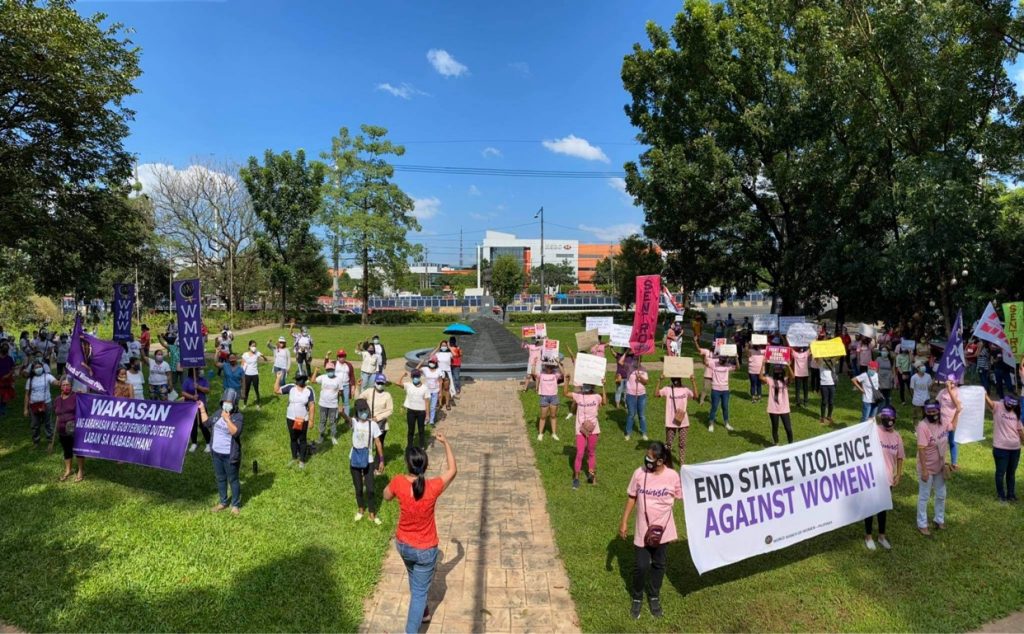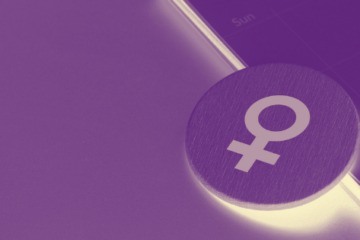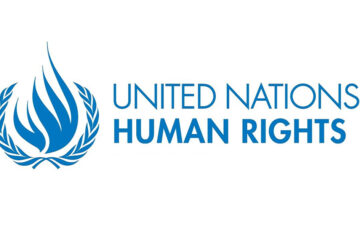
On this year’s International Day of the Elimination of all Forms of Violence Against Women (VAW), groups belonging to World March of Women-Pilipinas gathered at the Commission on Human Rights (CHR) to call attention to increased acts of violence on women as the pandemic continues to rage and economic crisis deepens. Donning hats and headdresses that signify women’s collective defiance to violence on November 25th, around one hundred and fifty (150) women also expressed their resistance through speeches and cultural performances.
The grassroots feminist movement underscored the situation of Filipino women in the workplace who have become the first casualties of dismissal and forced wage decrease while Filipino women overseas workers also suffer from heightened physical, sexual, economic violence.
According to Ellene Sana, Executive Director of the Center for Migrant Advocacy (CMA), the Covid 19 pandemic has aggravated different forms of violence that our women migrant workers have been facing even before. “Many were displaced, terminated from their jobs or under no work no pay – losing wages to remit to their families, pushing those who have and to remit savings risking their futures,”Sana shared. “This caused severe psychosocial and mental distress over their families’ survival and safety as well as their own.” CMA cited the cases of a seawoman found dead after learning that their trip was postponed yet again and a domestic worker who jumped to her death. “Employers also used the pandemic to cancel their day off while the domestic workers have to render longer work hours because families all work or study from home,” Sana stated. CMA added that where the employers are abusive, migrant domestic workers are trapped, sealed in more risks of abuse, including violence, and sealed off from running away to safety. “The pandemic will also drive them to risks of illegal recruitment and human trafficking and more violence,” Sana said.
In a speech, Joanna Bernice Coronacion, Deputy Secretary General of SENTRO pushed for the immediate ratification of ILO Convention 190 as an imperative for the working women, especially with Covid-19 expected to linger for at least another year or two. “Finalized in June 2019, the convention aims to prevent and eliminate violence and harassment in the world of work,” Coronacion added.
Judy Ann Miranda, Secretary General of Partido Manggagawa (PM), stated that the COVID pandemic, economic crisis and recent typhoons has put millions of women jobless and the poor reeling from the suspension of informal workers activities in the community and return of thousands of retrenched OFW’s. “Unemployment, lack of livelihood and disasters render women vulnerable to all forms of exploitation and violence,” said Miranda. “Hence, the need for the Philippine government to address the needs of the workers and the poor through sufficient aid for all, providing aid beyond lockdown, safeguard for workers and to uphold a humane and not militarized response to people’s grievances,” she added.
According to the World March of Women-Pilipinas, the deeper poverty resulted into more acts of violence against women, both in urban poor communities where cases of rape and prostitution of women have increased, and in the countryside where food insecurity has affected more women and girls now driven to prostitution in exchange for food.
Jean Enriquez, Executive Director of the Coalition Against Trafficking in Women – Asia Pacific (CATW-AP), cited cases of prostituted women infected by COVID-19 by customers. One died two weeks ago, according to Enriquez. “Government economic support is severely lacking for the most marginalized women in urban poor communities, that many were forced to prostitution,” she added.
Instead of social-economic support in the midst of the pandemic and economic crisis, what the women indigenous leaders have received from the government are political harassment and terrorist-tagging.
“The pandemic has surfaced the continuing problems – exclusion and isolation of indigenous women,” according to Judy Pasimio, National Coordinator of LILAK (Purple Action for Indigenous Women’s Rights). “Mining, large plantations, and mega-dams have continued to devastate indigenous communities, stealing their lands, destroying forests and bodies of water, that which indigenous women rely on for food, water, and medicines,” said Pasimio. She added that the indigenous women who are at the forefront of the struggle to defend their land, who provide food not only for their families but for the entire communities, are tagged as rebels and harassed. She said that in the time of pandemic and economic crisis, the government dangles economic support in return for their “surrender”: admit you are terrorists or starve.
Members of WMW-Pilipinas have also observed harassment of women online, especially human rights defenders who have been the targets of malicious memes, bullying, and misogyny in social media.
“We call for an end to gender-based violence, in all its forms and manifestations,” said Lisa Garcia, Executive Director of the Foundation for Media Alternatives (FMA), which saw a 30% increase in online gender-based violence (OGBV) this January-June 2020 in its OGBV data mapping initiative. “Violence against women online exacerbates further the discrimination and inequality that exists offline,” said Garcia. FMA supports a safe and inclusive internet, where women can actively exercise their freedoms. “We call for a feminist internet that allows women to express themselves, be represented, involved, informed and listened to without being subjected to threats and attacks, one that provides an empowering space for everyone,” FMA added.
Meanwhile, government responses remain wanting. Myrna Jimenez of SARILAYA said that the challenge of strengthening the functionality of Barangay VAW Desks, as the first line of response for survivors now takes top priority hand in hand with organizing women in the community. “Data from DILG’s 2019 National Statistical Report on the Functionality of VAW Desks reflect that only 19% of assessed barangays have reached the highest level of functionality,” said Jimenez. SARILAYA GMA Chapter in GMA Cavite now heads the federation of VAWC officers covering 27 barangays.
Jelen Paclarin, Executive Director of the Women’s Legal and Human Rights Bureau (WLB), reinforced this in saying that prior to COVID 19, services to respond to cases of violence against women and girls were already under-funded, and the lack of funding and efficient services to support victims of violence against women and girls have become more obvious during COVID 19. “Women are at a loss as to which agency they will report the incidents, since not all government offices are open during the community quarantine period,” Paclarin said. In less than three months, since May 2020, WLB received almost 100 inquiries from women and girls asking for help and assistance. “As we mark the International Day for the Elimination of Violence Against Women, we continue to demand proper funding of essential services for victim-survivors; we demand a gender-responsive allocation of resources towards eliminating violence against women,” Paclarin added.
WMW – Pilipinas stated in the program at CHR that the pandemic has further exposed the brutal hand of patriarchy and viciousness of the capitalist system, and how they are sustained, even intensified, by populist-authoritarian regimes, such as the current Duterte government. “Even if the pandemic ends, violence against women will not cease if this troika does not cease,” said Ana Maria R. Nemenzo, National Coordinator of WomanHealth Philippines and immediate past International Committee Member of WMW.
![]()



1 Comment
November 25 marks International Day for the Elimination of all Forms of Violence Against Women (VAW) | Foundation for Media Alternatives · December 2, 2020 at 9:53 am
[…] The collective of groups under World March of Women (WMW) – Pilipinas demonstrated their unity through solidarity speeches and cultural performances. The women’s rights advocates raised concerns on the worsening condition of migrant workers, women laborers, women forced into prostitution, and indigenous women, among others. Read more about the deepening economic crisis that intensify violence against women here. […]